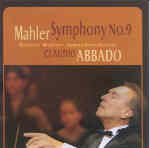In common with all of the most recent Abbado/Mahler releases, this Ninth is lacking in qualities of tension, atmosphere, and an idiomatic Mahler sound. Conceptually, this performance is almost identical to Masur’s New York Philharmonic recording for Teldec, in that it underplays the first movement so as to give additional weight to the finale. Timings are almost identical, but the resemblance ends there. If you compare, for example, the respective climaxes of the first movement, you can summarize Abbado’s shortcomings in a nutshell. Masur lets the solo trumpet emerge from the texture as Mahler intends; his collapse ends in a satisfying percussive crash. The softly-struck tam-tam and the muted trumpets in the ensuing funeral march create that special, idiomatic Mahlerian atmosphere that the music requires to make its proper expressive effect, and the chiming of the deep bells leads consolingly to the moment of recapitulation.
Now try Abbado. Trumpets and horns are buried in the welter of strings. The bass drum crescendo leading to the culminating cymbal crash has no impact, while the collapse is rushed, the tam-tam inaudible, the timpani weak. The dynamics between strings and muted trumpets are ill-judged, the brass tame and characterless, and the deep bells (bell plates here) conspicuous in their absence. And so it goes: the second movement gets all the various tempo adjustments right, but both here and in the Rondo:Buleske, the woodwinds have no snap, the brass no bite, meaning a lack of vulgarity and irony in the former and a total absence of malice in the latter (compare with Ancerl/Czech Philharmonic here!). Everything is subordinated to lightness of texture and a smoothly homogenized flow. The best movement is the culminating Adagio. Obviously, Abbado spent a great deal of time on string phrasing, and in this of all movements it pays big dividends. It’s a very beautiful and affecting performance, but whereas with the Masur the performance builds to this finale, with Abbado it merely marks time until the part the orchestra seemingly rehearsed the most finally arrives.
Part of the problem no doubt stems from the sonics: the strings are very forwardly balanced compared to everyone else. You might think that this matters comparatively less in the Ninth because of their primacy in the outer movements, but then you also can argue (as I would) that it’s all the more important that the winds, brass, and percussion be permitted sufficient prominence as appropriate to offer the necessary textural contrast (never mind making an idiomatic Mahler sound).
As with the Lucerne video of the Fifth, the picture format is 16:9 anamorphic, and sound options offered include PCM Stereo, Dolby 5.1, and DTS 5.1. It seems that in light of his recent illness, there is some sense of urgency to document as much of Abbado’s late legacy as possible. Nothing else explains the rush to release four decent but ultimately unremarkable Mahler symphony performances on both CD and video. I feel sad that they aren’t better, but then, if non-musical considerations have entered into the equation, what else can we expect? It may also be that Abbado feels the results have been all that he wanted. Certainly the playing of the Gustav Mahler Youth Orchestra (some of whose members don’t look so youthful) is fine as far as it goes. Nevertheless, what you hear is too much of the conductor, and not enough of the composer.
































